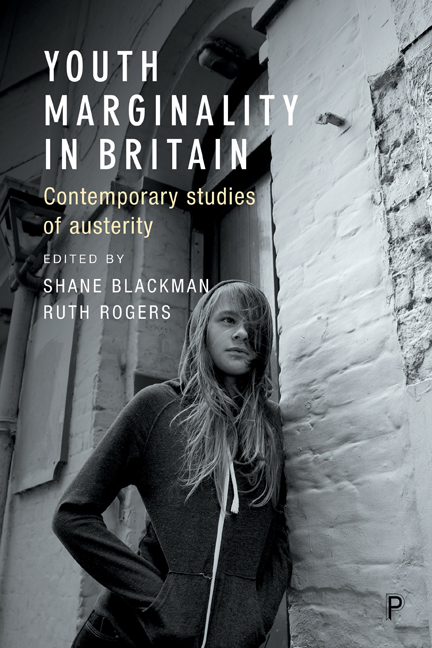four - Routine sanctions, humiliation and human struggle: qualitative biographies of young people's experience of live marginality
Published online by Cambridge University Press: 05 April 2022
Summary
Introduction
This chapter outlines the impact of government austerity measures in the context of a registered charity in Essex. Since 2012, the author has been a volunteer and treasurer at the charity. The charity provides a number of different services for young people, aged 11 to 25, including a drop-in centre. The drop-in centre is the main part of the charity's service and it offers a safe, confidential place for young people to talk about a range of issues. Between April 2014 and April 2015, some 433 contacts were recorded, where young people used the drop-in centre for help and support. The highest recorded concerns included welfare benefits, emotional support, food parcels and housing. The most dramatic change in the help provided by the charity has been an increase in practical support; most notably, there was during 2014/15 a 300% increase in requests for food parcels, together with support to look for work or benefits online.
Methods
The research conducted for this chapter is based on observation field notes and informal interviews with young people who use the charity. As part of the research ethics, the manager and the management committee were consulted about the research and they offered their support. All of the young people interviewed in the research gave their consent to take part, and their names have all been changed to ensure confidentiality. The core principal of the charity is confidentiality, and the young people who use the charity are fully aware of this.
Therefore, as the author is a volunteer at the charity, the young people were at ease discussing their experiences with her. She also endeavoured to remain emotionally detached as the experiences were described. However, it should be noted that there may be an issue with power relations, and that some young people may have felt pressurised to speak to the author (Weber, 1968). In addition, the author may not have achieved an unbiased sample, as the most vocal young people may have participated.
The qualitative approach was based on Clifford Geertz's (1973, p18) value of producing grounded descriptions, motivated by empathy with the young people, on the basis that they would be willing to share their thoughts, feelings and experiences in informal interviews as conversation.
- Type
- Chapter
- Information
- Youth Marginality in BritainContemporary Studies of Austerity, pp. 65 - 80Publisher: Bristol University PressPrint publication year: 2017



